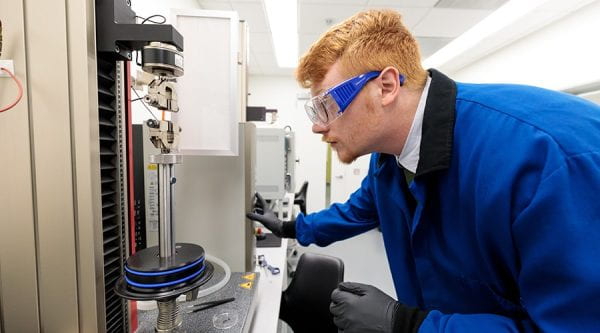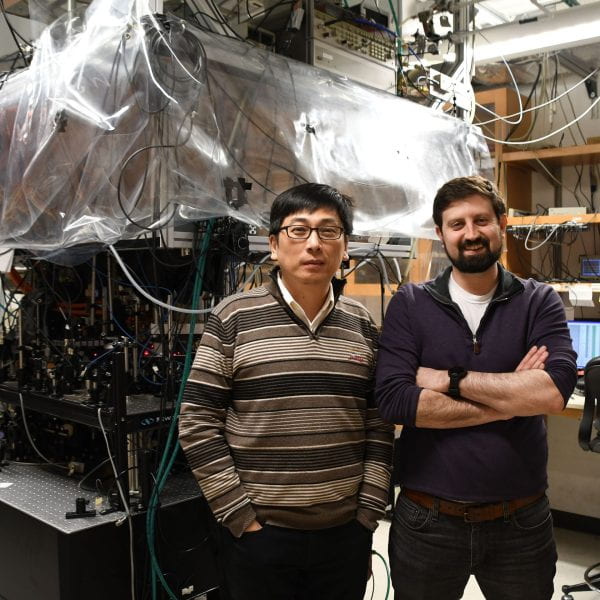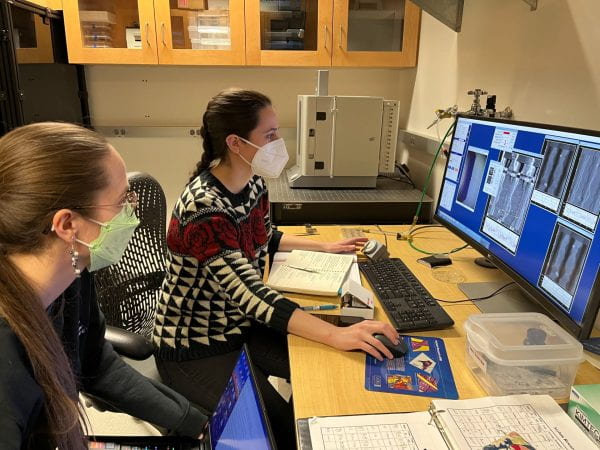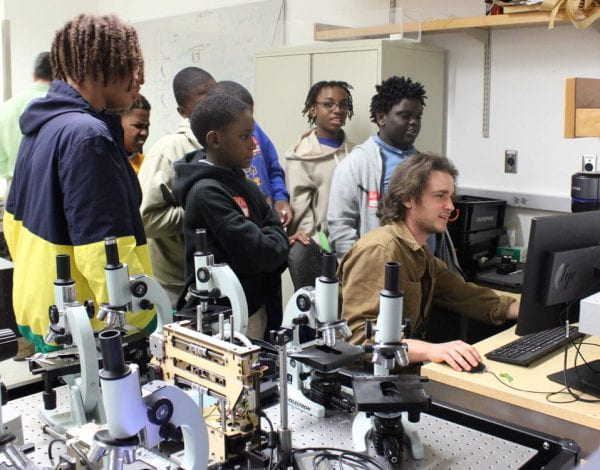EDUCATIONAL RESOURCES FOR THE RESEARCH COMMUNITY
MRSEC’s educational programs for the research community include seminar series and workshops, an active visitors program, and our Research Experiences for Undergraduates (REU) and pre-college internship programs. These programs foster interactions with and among Interdisciplinary Research Groups and the larger research community.
 Resources for graduate students and postdoctoral researchers
Resources for graduate students and postdoctoral researchers
- Rising Stars symposium
- Postdoctoral fellowship support
- MRSEC Graduate Fellowships
- Graduate student travel support
- IBM Internships
Rising Stars symposium
The Rising Stars in Soft and Biological Matter Symposium, co-sponsored by UChicago and the University of California San Diego MRSECs, provides a platform for exceptional early-career soft and biological matter scientists to present their work. Symposium participants are selected based on a track record of research accomplishments and demonstrated contributions to broadening participation in STEM.
Postdoctoral fellowship support
Kadanoff-Rice Fellowship
Recent recipients of a PhD in physics, chemistry, engineering, or related fields can apply for a Kadanoff-Rice Fellowship. Fellows conduct original research in experimental, theoretical, or computational materials science and engineering in collaboration with one or more MRSEC research groups. These fellowships provide a half-stipend for up to two years (at the advisor’s discretion), plus a $5,000 travel budget.
Eligibility and selection criteria
Applicants for the Kadanoff-Rice Fellowship must have sponsorship by a MRSEC faculty member.
Interested graduate students and postdocs not currently at the University of Chicago should contact potential faculty advisors to arrange for a sponsorship and ask to be nominated for the fellowship. The faculty member(s) will likely need a copy of your application materials (see below) and request that you meet other prerequisites, such as an interview. The faculty member(s) will then forward the application materials and a letter outlining the special expertise you will bring to the MRSEC research agenda and/or potential collaborations to the appropriate MRSEC administrator.
Current research topics of interest to MRSEC faculty include trainable soft materials, activated architectured materials, and the transmission of quantum information in materials.
MRSEC selects up to two Kadanoff-Rice Fellows per application cycle. Selection criteria include (i) excellence in research and (ii) interdisciplinary research interests.
We give priority to attracting new postdocs to our campus and/or those who bring a new perspective to the study of materials research.
How to apply
Eligible postdoctoral researchers should provide application materials to their advisor and request a nomination. A complete application contains:
- CV
- Three letters of recommendation
- Short (<1 page) statement written by the candidate describing their commitment to collaborative research
- Nomination letter from a MRSEC faculty member that explains why the candidate should receive a Kadanoff-Rice Fellowship
Competition schedule
| Application Deadline | Decision Notification | |
| Spring 2025 | April 15, 2025 | May 15, 2025 |
| Fall 2025 | October 15, 2025 | November 15, 2025 |
| Spring 2026 | April 15, 2026 | May 15, 2026 |
| Fall 2026 | October 15, 2026 | November 15, 2026 |
 Supplementary support for graduate students
Supplementary support for graduate students
MRSEC Graduate Fellowships
All graduate students training in MRSEC-supported laboratories can apply for the MRSEC Graduate Fellowship. This fellowship supports collaborative research projects that advance MRSEC scientific and/or outreach goals.
Individuals or teams of graduate students can submit proposals for collaborative research between multiple research groups. The collaboration should include at least one MRSEC laboratory. If the proposal does not include a MRSEC lab, it is preferred that the collaborating lab is located at UChicago. Proposals may establish new projects or support ongoing work in materials research that advance Interdisciplinary Research Group or Superseed research agendas.
The one-year fellowship carries a full stipend for one graduate student, plus a $2,500 travel budget. For teams involving two or more graduate students, MRSEC divides monetary support equally among the group and considers each member a MRSEC Graduate Fellow. MRSEC expects to support three fellowship positions at any given time, with funding to start immediately following a decision.
The MRSEC director and members of the MRSEC Graduate Fellowship Committee determine fellowship recipients.
Eligibility and how to apply
Graduate students at any stage of their education can apply. The criteria for proposal evaluation include (i) quality of the proposed materials science and (ii) demonstrated excellence in collaborative research of participant(s).
A complete application contains:
• CV(s) of applicant(s)
• One-page proposal (figures on additional pages) written by the graduate student(s) describing work to be performed during fellowship period
• Letter from at least one MRSEC PI describing how the proposal advances scientific and/or outreach goals of MRSEC
Competition schedule
| Application Deadline | Decision Notification | |
| Spring 2025 | April 15, 2025 | May 15, 2025 |
| Fall 2025 | October 15, 2025 | November 15, 2025 |
| Spring 2026 | April 15, 2026 | May 15, 2026 |
| Fall 2026 | October 15, 2026 | November 15, 2026 |
Travel support
MRSEC has a subsidy that allows us to provide up to $500 to help graduate students attend scientific conferences and give either oral or poster presentations on MRSEC-supported research. All graduate students working on MRSEC-supported research are eligible. The presentation must acknowledge MRSEC support for the research.
MRSEC intends to use this subsidy in situations where students have made an effort to secure student fellowships that pay partial conference support but did not receive support. We prefer to use these funds for smaller meetings, like Gordon Conferences, to increase impact. Large meetings, such as ACS, APS, and MRS, are excluded from this subsidy.
MRSEC will consider applications as they come in and until the earmarked funds are exhausted.
How to receive support
Graduate students planning to use this subsidy should contact the MRSEC director before the conference and provide:
- Poster or oral presentation title
- Conference name and location
- Co-author(s) on the presentation
- Statement regarding efforts made to secure additional support through conference participation and/or travel fellowships
To get reimbursed, students should also include the above items with the travel voucher. There will be no advance payments.
 Undergraduate research opportunities
Undergraduate research opportunities
Research Experiences for Undergraduates program
Undergraduates can gain research experience in the lab of a MRSEC faculty member through the Research Experiences for Undergraduates (REU) program. Possible project areas include current research in the IRGs, Superseed, and Seed projects.
Program benefits
During the summer, REU students become immersed in the University of Chicago research culture. They receive safety and ethics training, interact with graduate students and faculty members, and explore the city of Chicago. Participants attend seminars several mornings a week given by faculty and graduate students from across MRSEC and the Department of Physics. Guided tours of nearby national laboratories further broaden students’ exposure to state-of-the art materials research. Each student has the opportunity to present a seminar on their summer research during the last two weeks of the program and prepare a written report.
As registered University students, REU students also have full University privileges for the duration of the program, including access to libraries and athletic facilities, and substantial discounts to University-sponsored social and cultural events.
The stipend for the full 10-week summer program (approximately early June to mid-August) is $7,000. The program provides a modest travel expense reimbursement for flights and personal vehicles (no rental cars). Participants must be US citizens or permanent residents who are enrolled in but not yet graduated from an accredited undergraduate college degree program with a concentration in a materials science–related field.
The highly selective program chooses participants from a nationwide pool and has an acceptance rate of less than 10%. Many participants become listed as co-author on publications resulting from their summer research projects. About 75% of MRSEC REU students enrolled since 1995 have gone on to graduate studies in related fields or have expressed an intent to apply for graduate study upon completion of their undergraduate degree.
How to apply
Interested undergraduate students can apply using the online web application. Deadline for the 2025 summer program is February 13, 2025.
If you have questions about the MRSEC REU program, please email mrsec_reu@uchicago.edu.
K-12 science Outreach Programs
UChicago MRSEC offers K-12 science outreach programs for students and teachers. For more information about our science outreach programs, contact Chris Ahn, Director of Education.
Programs for Students and Families
After-school Science Clubs
Through our weekly after-school science clubs, graduate student and postdoc volunteers work closely with elementary and middle school students to introduce them to scientific concepts and develop their interests in STEM fields.
Modern Materials and Technologies Colloquium
UChicago MRSEC graduate students work in collaboration with a physics teacher to design and teach a weekly high school course at Lindblom Math and Science Academy.
Family Science Nights
UChicago MRSEC partners with K–12 schools to run Science Nights throughout the school year, and our team of volunteers provide and run interactive science demonstrations for students and families.
eSMART
Through this immersive summer program, high school students interested in physics meet MRSEC scientists, learn about research, tour our facilities, try hands-on experiments, and attend field trips to museums and laboratories.
High School Internship
The high school internship program provides students the opportunity to work and conduct research in MRSEC laboratories. We match high school students with a lab group and a graduate student mentor based on their research interest.
Polk Brothers Mathematics Program
The Polk Brothers Mathematics Program introduces teachers to the practical application of mathematics to materials science and provides them with related educational activities that they can incorporate into their classrooms.
Teacher STEM Professional Development
MRSEC works with K–12 schools to provide professional development sessions for teachers to practice new and engaging teaching strategies in STEM.
Informal science outreach
MRSEC runs a suite of programs to engage the public in concepts related to our research and to promote a greater appreciation of science. Our informal science outreach programs include:
- Museum exhibits
- Physics with a Bang!
Broadening Participation
MRSEC has a comprehensive and integrated focus on broadening participation. We seek to identify and adopt best practices and remove barriers to ensure that individuals and ideas can flourish. Our initiatives include:
- Coordinating with University administration to hire faculty
- Rising Stars symposium to identify potential faculty candidates and postdoctoral researchers
- PREM with XULA
- Reinstate Bridge to Doctoral Program
- Research Experiences for Undergraduates program
- Neighborhood programs



